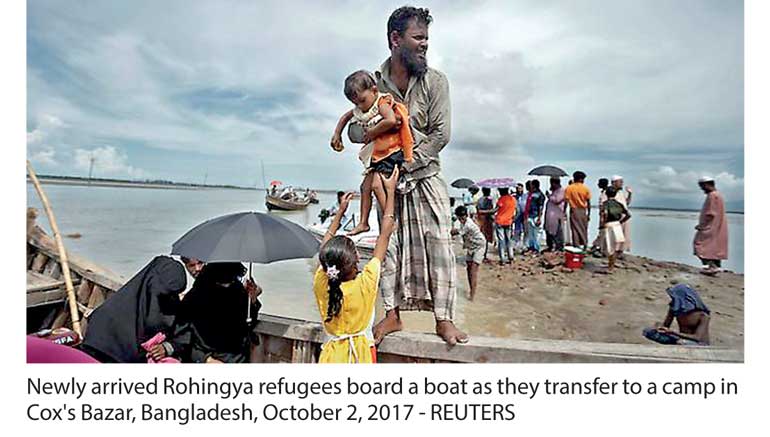Monday Feb 23, 2026
Monday Feb 23, 2026
Wednesday, 4 October 2017 00:00 - - {{hitsCtrl.values.hits}}
 Dhaka (Reuters): Bangladesh and Myanmar agreed on Monday to set up a “working group” to plan the repatriation of more than half a million Rohingya Muslim refugees who have fled to Bangladesh to escape an army crackdown, the Bangladeshi foreign minister said.
Dhaka (Reuters): Bangladesh and Myanmar agreed on Monday to set up a “working group” to plan the repatriation of more than half a million Rohingya Muslim refugees who have fled to Bangladesh to escape an army crackdown, the Bangladeshi foreign minister said.
The United Nations has called the exodus of 507,000 Rohingya since late August the world’s fastest-developing refugee emergency, and says Buddhist-majority Myanmar is engaging in ethnic cleansing against its Rohingya Muslim minority.
Myanmar denies that. It says its forces are battling Rohingya “terrorists” who triggered the latest wave of violence with coordinated attacks on the security forces on Aug. 25.
Myanmar says more than 500 people have been killed since, most of them insurgents, whom it has accused of attacking civilians and setting most of the fires that have reduced to ashes more than half of more than 400 Rohingya villages in the north of Rakhine State.
Bangladesh Foreign Minister Abul Hassan Mahmood Ali said he and Myanmar official Kyaw Tint Swe had agreed in their talks to set up the working group to draw up plans for repatriation. “We are looking forward to a peaceful solution to the crisis,” Ali told reporters.
Kyaw Tint Swe did not speak to the media and government spokesmen in Myanmar were not immediately available for comment.
Waves of Rohingya have taken refuge in Bangladesh over the years complaining of persecution, in particular in the late 1970s, the early 1990s and in October last year, following smaller insurgent attacks on the security forces.
The neighbours have agreed on repatriation plans before, but the fundamental problem - the status of Rohingya in Myanmar – remains unsettled. The Rohingya are denied citizenship and classified as illegal immigrants, despite claiming roots in Myanmar that go back centuries, with communities marginalised and subjected to bouts of communal violence over the years.
Ali, asked about agreements in the past having little impact, said: “This time we want to be hopeful.”
In Geneva, UN High Commissioner for Refugees Filippo Grandi told a meeting problems of statelessness had to be tackled.
“Nowhere is the link between statelessness and displacement more evident than with the Rohingya community,” he said. The crisis over the treatment of the Rohingya is the biggest problem Myanmar leader Aung San Suu Kyi has had to face since forming a government last year after winning a landmark 2015 election.
The Nobel peace laureate, in an address to the nation last month, said Myanmar was ready to start a verification process under a 1993 agreement with Bangladesh and “refugees from this country will be accepted without any problem”.
Myanmar has refused to grant access to a UN fact-finding mission but Suu Kyi last year appointed a team led by former UN secretary-general Kofi Annan to draw up recommendations on solving problems in Rakhine.
The commission presented its recommendations on Aug. 24, a day before the insurgent attacks, among them a review of a law that links citizenship and ethnicity and leaves most Rohingya stateless.
The panel also recommended that the government punish rights violations, ensure the right to freedom of movement and invest in infrastructure to lift the state out of poverty.
Suu Kyi, in her address to the nation last month, said she was committed to the recommendations.
There were already about 300,000 Rohingya refugees in Bangladesh before the latest exodus.
GENEVA (Reuters): Myanmar told the United Nations refugee agency on Monday its top priority was to bring back Rohingyas who have fled to Bangladesh, but much work was needed to “consolidate stability” in its troubled northern region of Rakhine.
Bangladesh and Myanmar agreed on Monday to set up a working group to plan the repatriation of more than half a million Rohingya Muslim refugees who have fled to Bangladesh to escape an army crackdown, the Bangladeshi foreign minister said.
Win Myat Aye, Myanmar’s Union Minister, Minister of Social Welfare, Relief and Resettlement, addressed the UN refugee agency’s (UNHCR) Executive Committee after UN refugee chief Filippo Grandi called for resolving issues related to Rohingya citizenship and rights.
“Our next immediate priority is to bring back the refugees who have fled to Bangladesh,” Win Myat Aye told the Geneva forum. “The repatriation process can start any time for those who wish to return to Myanmar. The verification of refugees will be based on the agreement between the Myanmar and Bangladesh governments in 1993,” he said.
“Those who have been verified as refugees from this country will be accepted without any problem and with full assurance of their security and their access to human dignity.”
The status of Rohingya remains unsettled in Myanmar where they are denied citizenship and classified as illegal immigrants, despite claiming roots in Myanmar that go back centuries, with communities marginalised and subjected to bouts of communal violence over the years.
Many refugees are gloomy about the prospects of going back to Buddhist-majority Myanmar, fearing they will not be able to furnish the documents they anticipate the government will demand to prove they have a right to return.
Win Myat Aye accused “terrorist organisations” of launching coordinated attacks on police posts on Aug. 25 that sparked the exodus. He said in addition to a humanitarian perspective, handling the situation also required “considerations from security and political angles”.
“Although the security situation has improved in the affected areas and (there has been) no more armed clashes since Sept. 5, much needs to be done to consolidate the stability in the region,” he said.
“Giving preferential treatment to one group in terms of providing humanitarian assistance or media advocacy could worsen the sentiment of the other group,” he said.